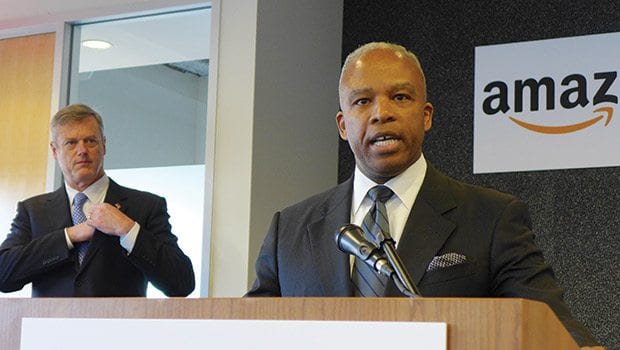Baker administration’s new plans to keep and grow businesses in the state
Links education and workforce training to employer needs

Ten months after its founding, members of Governor Charlie Baker’s Workforce Skills Cabinet, announced the group’s first policy priorities. They aim to bring, keep and grow businesses in the state by better preparing the workforce with the skills employers need.
“The skills gap is leaving thousands of vacancies unfilled across the commonwealth,” said James Peyser, secretary of education.
The Cabinet represents a new cross-collaboration of educational, economic and workforce sectors. Its members have taken an employer’s-eye view and developed three initiatives: a one-stop resource for connecting businesses with assistance and services; expansion of career-focused education in manufacturing, trades and STEM; and state grants to support programs in each region that develop skills to match business needs.
Created in February, the Workforce Skills Cabinet has been meeting with business and education professionals across the state to develop its plans. Presenting the initiatives along with Baker were Cabinet members Ronald L. Walker II, secretary of labor and workforce development; Pesyer; and Jay Ash, secretary of housing and economic development.
“We want to do a better job of aligning our educational institutions and workforce development activity with what’s going on out there in the economy generally, so we can be more of a demand-driven and customer-centric supporter for businesses and industries looking to grow in the commonwealth,” Baker said.
Cabinet members pointed to Amazon, whose Kendall Square office was the site of the announcement, as an example of successful collaboration between state and private company to keep jobs in Massachusetts. Since opening the office in Kendall Square, Amazon has expanded and hired locals in other cities and towns, including its robotics facility in North Reading and a new fulfillment center that will open at Fall River.
“The career center worked hand and hand with Amazon to help them create and fill 200 jobs,” said Walker.
On the Web
BizWorks: www.mass.gov/lwd/employment-services/services-for-employers/expanding-business-engagement/
BizWorks
In the past, there has been lack of coordination and unification in the state’s approach to business, Baker said.
A new team called BizWorks aims to fix that by offering online and on-the-phone service to connect businesses with a wide range of resources such as workplace safety training, tax incentives and consulting.
“People said historically about Massachusetts that there’s a lot of bifurcation and fragmentation in how we do business,” Baker said. “BizWorks will make it possible for us to tailor all of the various elements of the Commonwealth’s capacity to support businesses that are looking to grow here, to locate here, into a single enterprise.”
Employer-driven education
Discussions with employers on their needs guided the Cabinet members’ educational and training recommendations, Peyser said.
“One of our central goals is to respond quickly to the training needs of employers looking to move into Massachusetts or grow here,” he said. “Of equal importance is trying to address long-term human capital pipeline needs employers have.”
One form this takes is expanding the capacity of vocational and technology programs at high schools and community colleges. Four thousand students are on waiting lists statewide for such schools, said Pesyer, adding that he expects the true number is larger, but that lack of awareness or proximity to such schools prevents other students adding their names to the lists.
Baker noted growing shortages of plumbers, machinists, electricians and other trade jobs as people currently in those careers age and are succeeded by a declining pool of replacements.
“There are firms that literally cannot expand because they cannot find enough people with the skills to meet the demands that they have with their existing customer base,” he said.
A third prong of the effort involves tailoring plans to each region. The Cabinet members said they recognize different parts of the state have different strengths and skill needs and that business, education and workforce development plans must be area-specific.
“Our approach is not one size-fits-all for the Commonwealth,” Ash said. “We are focused on regional approaches.”






